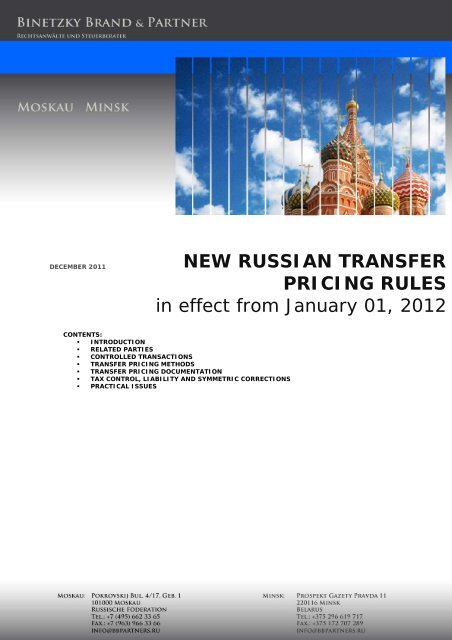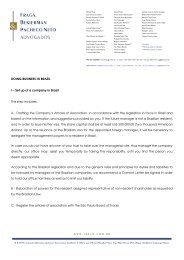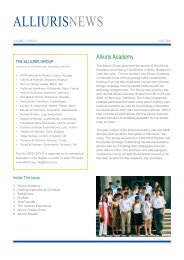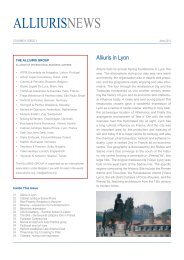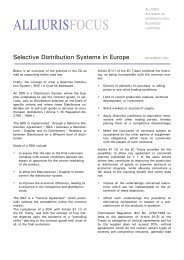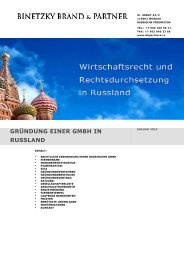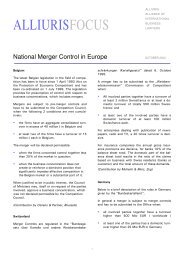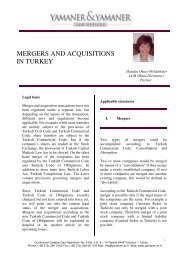New Russian tranfer rules - AllIURIS
New Russian tranfer rules - AllIURIS
New Russian tranfer rules - AllIURIS
Create successful ePaper yourself
Turn your PDF publications into a flip-book with our unique Google optimized e-Paper software.
DECEMBER 2011<br />
NEW RUSSIAN TRANSFER<br />
PRICING RULES<br />
in effect from January 01, 2012<br />
CONTENTS:<br />
INTRODUCTION<br />
RELATED PARTIES<br />
CONTROLLED TRANSACTIONS<br />
TRANSFER PRICING METHODS<br />
TRANSFER PRICING DOCUMENTATION<br />
TAX CONTROL, LIABILITY AND SYMMETRIC CORRECTIONS<br />
PRACTICAL ISSUES
INTRODUCTION<br />
Starting from the January 01, 2012 after a long period of debates new<br />
transfer pricing <strong>rules</strong> shall finally come into force in Russia. Thus, a step<br />
forward will be taken to adjust the <strong>Russian</strong> tax legislation to the OECD<br />
Transfer Pricing Guidelines and international transfer pricing principles.<br />
Generally, <strong>Russian</strong> and foreign businesses are expected to gain more<br />
transparency and clarity.<br />
The key changes include a new definition of related parties which has<br />
been precised as well as new regulations on controlled transactions and<br />
pricing control by the <strong>Russian</strong> tax authorities based on comparison with<br />
the market level and profitability of related parties’ transactions.<br />
RELATED PARTIES<br />
The parties are deemed to be related:<br />
if one party directly or indirectly participates at least 25% in<br />
another (previously – 20%), or<br />
if one party to transaction is entitled to appoint more than 50% of<br />
the board of directors of another party, etc.<br />
The notion of related parties shall apply not only to the enterprises<br />
incorporated in accordance with the Corporate Law, though. Such relation<br />
may result, as earlier, from other circumstances i.e. family ties or kinship<br />
connections. From now on there will be eleven criteria for that instead of<br />
only three as previously. Such relation may also be established by court<br />
based on other grounds. Of novelty is that in the cases not specified by<br />
law enterprises may declare themselves as related under certain<br />
circumstances.<br />
CONTROLLED TRANSACTIONS<br />
According to the new transfer pricing <strong>rules</strong> the tax authorities’ control<br />
shall apply to the controlled transactions which are the transactions<br />
between the related parties and specific transactions between entities<br />
which are not considered as related. Specifically enumerated are the<br />
following transactions:<br />
cross-border transactions between related parties;<br />
cross-border transactions dealing with the exchange-traded goods<br />
on the condition that the transaction revenue with one entity<br />
2
exceeds RUB 60 million annually;<br />
transactions with the entities based in the jurisdictions “blacklisted”<br />
by the <strong>Russian</strong> Ministry of Finance (offshores) if the revenue<br />
from the transactions with one entity exceeds RUB 60 million<br />
annually;<br />
transactions between related parties on the <strong>Russian</strong> domestic<br />
market inasmuch as their proceeds in 2012 exceed RUB 3 billion<br />
(as from 2013 RUB 2 billion, as from 2014 RUB 1 billion);<br />
transactions between related parties which are conducted through<br />
intermediates whereby the latter run no risks, assume no extra<br />
functions and use no property;<br />
other transactions between related parties on the <strong>Russian</strong> domestic<br />
market with annual revenue from such transactions from RUB 60<br />
million, particularly, if one of the parties to the transaction is<br />
exempted from the profits tax.<br />
Excluded from this general rule, however, are particularly the<br />
transactions:<br />
whereby the contracting parties constitute the consolidated group<br />
of taxpayers, or<br />
which parties are <strong>Russian</strong> enterprises registered in the same<br />
federal subject of the <strong>Russian</strong> Federation having no separate<br />
subdivision in other federal subjects of Russia or outside Russia<br />
and having no losses for tax purposes.<br />
TRANSFER PRICING METHODS<br />
The TP methods have been extended up to five:<br />
comparable uncontrolled price method;<br />
resale minus method;<br />
cost plus method;<br />
transactional net margin method; and<br />
profit split method.<br />
Application of the comparable uncontrolled price method shall prevail. The<br />
tax authorities may also apply a combination of two or more methods. If<br />
the market level price with regard to a certain transaction on the basis of<br />
the above methods could not be determined then an independent<br />
appraisal may take place.<br />
There has been retained the presumption of the “arm-length” price<br />
3
applied in controlled transactions, whereby the tax authorities in case of<br />
doubt must prove if they think it otherwise. This determination has been<br />
extended by the right of the taxpayer to correct the tax base in the<br />
contract independently if the contract price appears below the market<br />
level.<br />
TRANSFER PRICING DOCUMENTATION<br />
Now the enterprises are under obligation to notify the tax authorities and<br />
submit to them the documentation related to the controlled transactions.<br />
But this applies only subject to the total amount from the controlled<br />
transactions between the two entities exceeding RUB 100 million<br />
annually. This threshold value will be reduced down to RUB 80 million in<br />
2013, with no restrictions applied as from 2014. The tax authorities may<br />
request the documents to be submitted. The taxpayer is obliged to<br />
provide them within 30 days. The taxpayer may also submit other<br />
documents and additional information beyond the required by virtue of<br />
law to prove that transactional pricing is at the market level. Moreover,<br />
the major taxpayers may enter into advance pricing agreements with the<br />
tax authorities prior to intended transactions which might mitigate tax<br />
risks in advance.<br />
However, the above obligations in relation to the documentation do not<br />
apply to:<br />
taxpayer’s transactions with parties which are treated as nonrelated<br />
to such taxpayer;<br />
transactions which pricing set forth by the <strong>Russian</strong> Anti-Monopoly<br />
Service;<br />
securities and futures trading on the organized equity market;<br />
transactions with regard to which the advance pricing agreements<br />
with the tax authorities are concluded.<br />
TAX CONTROL, LIABILITY AND SYMMETRIC CORRECTIONS<br />
Starting from January 01, 2012, the tax authorities may conduct in<br />
relation to the controlled transactions a new form of tax audit, which may<br />
be performed independently from the currently existing on-site and field<br />
tax audits. <strong>New</strong> transfer pricing <strong>rules</strong> make also the “symmetric”<br />
correction of tax obligations of one of the contracting parties possible if<br />
another party has been subject to tax charge by results of TP tax audit. If<br />
the tax authorities discover that prices have been determined incorrectly<br />
4
significant penalties may be imposed. This penalty, however, shall apply<br />
starting from 2014 and shall amount 20% of the underpaid tax. The fines<br />
and penalties will be increased up to 40% of the underpaid tax as of<br />
2017.<br />
PRACTICAL ISSUES<br />
Given the new transfer pricing <strong>rules</strong>, the businesses are currently<br />
challenged with the responsibility of clarifying the issue to what extent<br />
they will get affected by these new transfer pricing regulations. It will<br />
consequently mean that the businesses will have to review the pricing<br />
methods used by them, introducing appropriate corrections if required.<br />
Moreover, the businesses will have to take all precautions and use their<br />
best efforts to make their transfer pricing documentation comply with the<br />
statutory requirements.<br />
5
Contacts:<br />
Thomas Brand<br />
Lawyer<br />
Partner<br />
E-Mail: thomas.brand@bbpartners.de<br />
Mob.: +7 (965) 106 56 11<br />
Tel.: +7 (495) 662 33 65<br />
Fax: +7 (963) 966 33 66<br />
Valeria Khmelevskaya<br />
Lawyer and tax advisor<br />
Partner, Head of Tax Practice<br />
E-Mail: valeria.khmelevskaya@bbpartners.de<br />
Mob.: +7 (916) 171 67 56<br />
Tel.: +7 (495) 662 33 65<br />
Fax: +7 (963) 966 33 66<br />
Note: This information represents only a general overview and does not replace the advice in<br />
particular cases. Any liability for the content is completely excluded.<br />
6


